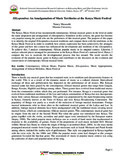COMPETENCY OF MUSIC PRODUCTION GRADUATES FROM KENYAN TERTIARY INSTITUTIONS TO PRODUCE LOCAL MUSIC: PERSPECTIVES OF GRADUATES, MUSIC PRODUCERS, AND MUSICIANS
Abstract
Kenya's music industry, rich in historical and cultural diversity, has evolved from its pre-colonial roots—characterized by distinct tribal musical styles and instruments—into a dynamic contemporary scene influenced by both indigenous traditions and global trends. Despite these developments, a significant gap exists between the training provided by Kenyan tertiary institutions and the practical demands of the local music industry. While current curricula emphasize technical proficiency along Western musical paradigms; however, the industry places high value on social narratives and cultural references. In response to this, this study interrogated key stakeholders in the music production industry in order to: (1) assess the perceived readiness of Kenyan music production graduates to produce music that meets industry demands; (2) examine the alignment between theoretical and practical knowledge gained in tertiary programs and industry requirements; and (3) explore the perceived value of musical talent versus formal education among Kenyan musicians. Guided by Vygotsky’s Social Constructivism and Bourdieu’s Cultural Capital Theory, this study adopted a qualitative research design with a phenomenological approach to understand stakeholders' lived experiences and perceptions of music production education in Kenya. Conducted in Nairobi County, the study used purposive sampling to select 27 participants including: six music production klgraduates, five producers, five musicians, and eleven other music industry professionals. The findings reveal critical gaps in the preparedness of Kenyan music production graduates and highlight several key issues. Graduates stated they were unprepared to meet the practical and cultural demands of the music industry, with a notable disconnect between their academic training and industry expectations. While providing essential technical skills, formal education was found lacking in addressing the cultural competencies and contemporary production techniques required for the local market. Graduates with formal training were perceived to have limited knowledge on matters bordering on cultural identity, which is crucial for resonating with local audiences. Conversely, informal, self-taught producers demonstrated greater adaptability and a stronger grasp of local music trends. The study concluded that music production education should strike a balance between technical training and cultural education, reflecting both traditional and contemporary music practices. Accordingly, this study contributes to existing knowledge by emphasizing the need for educational reforms that integrate practical experience, cultural understanding, and adaptability. Recommendations include updating music production curricula to incorporate local music trends and provide hands-on learning experiences, strengthening partnerships between educational institutions and industry professionals, and fostering continuous learning for graduates. Additionally, it proposes continuous collaboration between industry experts and educators to bridge the gap between academic learning and industry practice.
Collections
Related items
Showing items related by title, author, creator and subject.
-
DETERMINING RELEVANCE OF UNDERGRADUATE UNIVERSITY MUSIC CURRICULA TO THE REQUIREMENTS OF SELECTED MUSIC JOB MARKETS IN NAIROBI COUNTY, KENYA
MOCHERE, JOYCE MUDENGANI (Kabarak University, 2022)The relevance of undergraduate university music curricula to the requirements of the music job market is paramount in ensuring that bachelor of music graduates acquire relevant knowledge, skills, competencies and attitudes ... -
INCLUSION OF KENYAN POPULAR MUSIC IN SECONDARY SCHOOL MUSIC CURRICULUM: A STUDY OF SELECTED SCHOOLS IN VIHIGA COUNTY, KENYA
ADHIAMBO, OTIENO ALICE (KABARAK UNIVERSITY, 2021-11)Popular music is an important ingredient in the day-to-day lives of many young people, especially the youth. In Kenya, this genre has not been included in the secondary school music curriculum. The glaring omission of ... -
Zilizopendwa: An Amalgamation of Music Territories at the Kenya Music Festival
Masasabi, Nancy (KABARAK UNIVERSITY, 2018-10-14)The Kenya Music Festival has incorporated contemporary African musical genres in the festival under the name adaptation and arrangement of zilizopendwa. Somehow in this context, the genre has become very popular among ...




